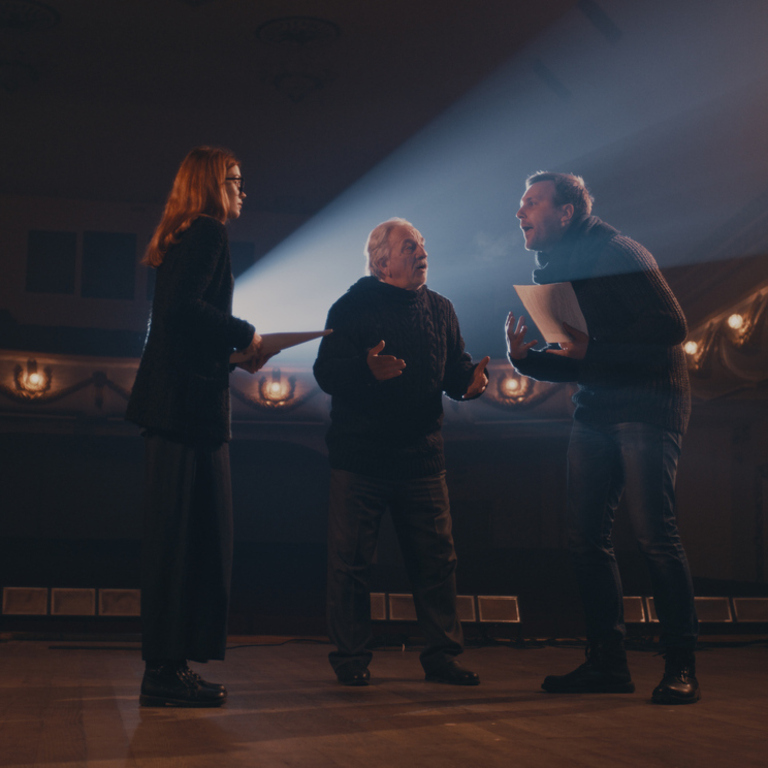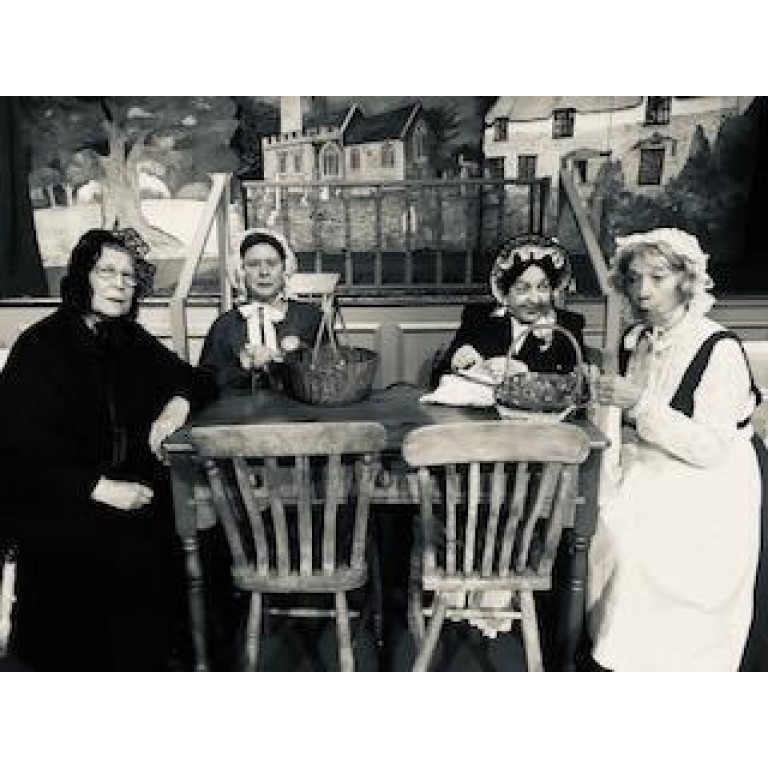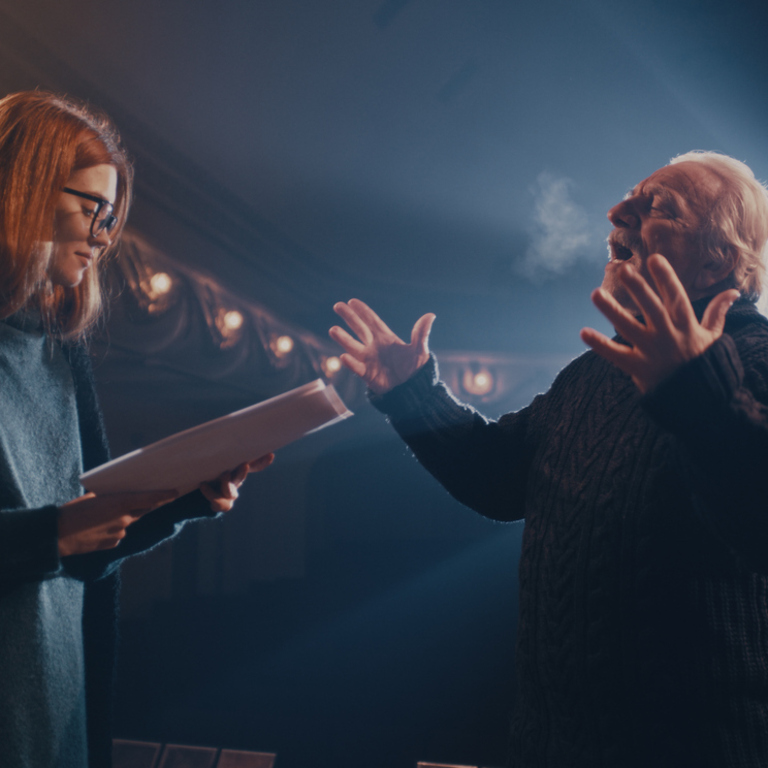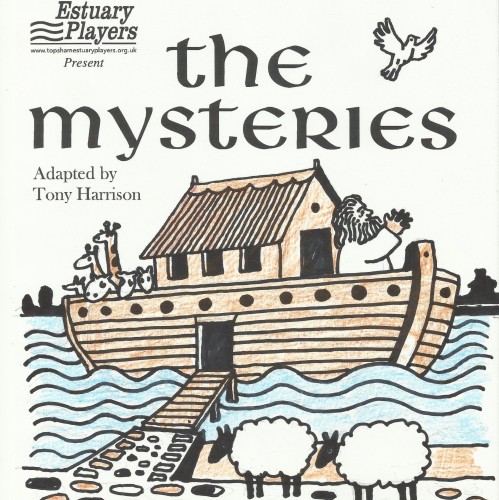
posted 8th July 2025
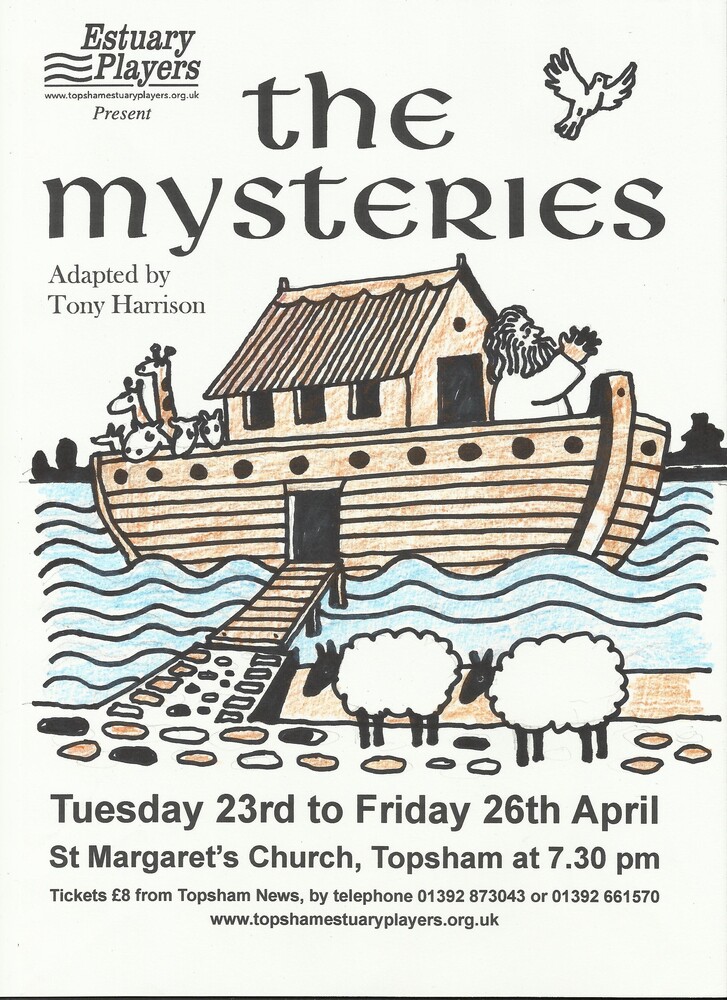
The Mystery Plays represent the beginnings of English drama. Performed by the craft guilds around mediaeval cities, they were designed to teach the stories and lessons of the Bible - Old and New Testaments - at a time when not only was the Bible not translated into English, but most people could not read anyway. They are a rugged but poetic way of telling stories, and are told with humour, passion, and a relentless devotion to moving the plot along. Estuary Players are aiming to make this a big production, with a live band throughout, a large cast and all in the exciting setting of Topsham's magnificent parish church. We are using the adaptation made by poet Tony Harrison for the acclaimed National Theatre production in the early 80's. Harrison drew on all the extant cycles, the complete ones of which are the York, Wakefield and Coventry versions, and he retained the mediaeval English where it was understandable still, but where not he retained a Northern rhythm and vocabulary so that the whole is as authentic as it can be and still be perfectly understandable to modern audiences.
TONY HARRISON was born in Leeds, Yorkshire in 1937.
TONY HARRISON is Britain’s leading theatre and film poet. He has written several pieces for the National Theatre including THE MISANTHROPE (1973 and 1989), PHAEDRA BRITANNICA (1975), BOW DOWN (1977), THE ORESTEIA (1981 awarded the European Poetry Translation Prize), THE MYSTERIES (1985 & 2000) and THE PRINCE’S PLAY (1996). He has also written and directed for the National Theatre, THE TRACKERS OF OXYRHYNCHUS, which had its world premiere in the ancient stadium of Delphi, Greece, and opened in the Olivier, NT in 1990 and SQUARE ROUNDS in1992, a play he directed in Russian translation at the Tanganka Theatre, Moscow in 2007. His most recent play for the National was FRAM in 2008.
He explains in his introduction to the published version of The Mysteries that the process by which the originals were created was one of “translation, accretion, adaptation and revision.” He tells how he worked with the National Theatre actors in a similar fashion to give modern dramatic shape to these stories which everyone knows, but still have amazing power. He says he offered himself “as a Yorkshire Poet, who had come to read the metre.”
The Second Shepherds’ Play
This segment of the cycle, sometimes known as “Mak the Sheep Stealer” is the only one not to have a biblical origin, and many have questioned its right to be included at all. It comes from the Wakefield text and t is clearly about issues contemporary to the mediaeval players themselves, and clings on only tentatively to the main plot lines, by being about the same shepherds who visit the new born Jesus in the stable. Some have complained about the combination of low farce with the high religious intent of the rest of the plays, but others have suggested that it arose from years of horse-play and ad-libbing in rehearsal. In our production it is not drastically different in tone from the presentation of the early bible stories. It is in any case similar to folk tales from all over Europe, and is a clear parody of the Nativity itself.
We have kept it because in our view, it represents very well how the working people of the 13th to the 16th centuries would have viewed the stories and themes in front of them when they came to perform their play each year – and it is very entertaining – you will get the opportunity to join in with a song, and throw wet sponges at the cast! And here are the words:
Whose tups are these? Whose tups are these?
They’re old Jack Bourne’s, I can tell ‘em by their horns
And I found ‘em in the Vicarage Garden!
Musical Numbers
Opening Number We Sing Allelujah Richard Thompson
The Creation
Pride is Out Music: Ben Beeson
In the Beginning Music: Ben Beeson
Alas My Wits Are Wode With Woe Music: Ben Beeson
The Old Dance Ian Telfer
Family Stories
Cain’s Rant Music: Ben Beeson
Noah’s Prayer Music: Ben Beeson
Didn’t It Rain Traditional
Abraham and Isaac Music: Ben Beeson
The Nativity
The Annunciation Music: Ben Beeson
Shay Fan Yan Lay Trad arr Ben Beeson
Mary’s Song Words: William Blake, Music: Ben Beeson
Here Is Our King Music: Ben Beeson
Kings in Confusion Music: Ben Beeson
Whose Tups Are These Traditional
Coventry Carol Traditional
I Am Sent from God….Death is my Name Music: Ben Beeson
INTERVAL
Opening Number It Was Christmas Day Traditional
Death and Resurrection
Entry into Jerusalem Music: Ben Beeson
Thirty Pence Pocket Music: Ben Beeson
Accusation Music: Ben Beeson
Meet on the Ledge Richard Thompson
Alas Music: Ben Beeson
Look Up, Look Up John Tams
We Sing Allelujah reprise Richard Thompson
Closing Number Babylon Traditional
Cast in alphabetical order:
David Batty, Ben Beeson, John Bradley, Maggie Butt, Alan Caig, Joana Crisostomo, Bob Drury, Chris Eilbeck, Howard Eilbeck, Sally Elkington, Tom Epton, Helen Foster, Gordon Halliday, Jacquie Howatson, Rob Hole, Victoria Jones, Jill Mather, Antony Morris, Keith Palmer, Avril Pattinson, Bill Pattinson, Clare Philbrock, Ian Potts, Cass Thorne, Lynn Trout, Angela Wallwork, Kate Wannell, Rosemary Whitehurst, Geoff Williams, Carys Williams, Hannah Williams, Rhodri Williams.
The Band
Ben Beeson, Keyboards; Frazer Kerslake, Bass; Ray Girvan, Accordion; Steve Preston, Bassoon; Ron Murray, Keyboards and Guitar;; Joe Hodges, drums; Brian Wallwork, Woodwind; Chris Cartwright, Woodwind; Roger Webster, Hurdy Gurdy
The Chorus Geoffrey Brace, Sheila Burgess, Jo Meredith, Alison Marsh
Solo Singers Rosie Mullin, Alex Ford
Production
Director Alan Caig
Musical Director Ben Beeson
Assistant Directors Ian Potts, Janine Warre
Assistant Musical Directors Ron Murray, Geoffrey Brace
Design and Publicity Phil Keen
Construction Eliot Wright
Lighting Peter Tapp
Props Co-ordination Marie Taylor
Props Assistant Cally Pettit
Wardrobe Team Janine Warre, Clare Philbrock, Isla Morgan, Angela Wallwork, Sylvia Brace, Maggie Butt
Photography Victoria Jones, Bryan Wallwork
Business Management Rosie Munns, Howard Eilbeck
Original Music Score Ben Beeson









